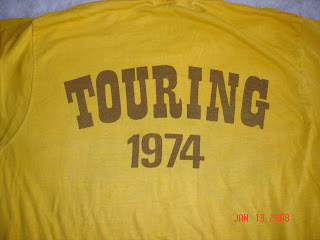Oddly enough, While I was at KLOL FM my first outside job offer came from Rick Rawlinson, who was the current station manager of KLOL. He called me into the office and offered me the program director job at KRLY FM. He had just accepted the job of General Manager there, and had just moments earlier gave notice to the KLOL ownership.
I didn't take the job offer seriously, in fact I didn't take it at all. Rick Rawlinson went to KRLY and dropped dead shortly after, the victim of a sudden heart attack. That was the end of the plan for AOR at KRLY. There was a KRLY station format change, but not to AOR, a general housecleaning of on the air staff and accompanying firings shortly after his death. So, there I would have been, a new kid in town, in a place with no family,and without a job. But as my boss Tony Raven (Jim Prutett) told me time after time, "Radio gigs come and go. When a gig ends, you've just gotta go out there and find another one." This is what Tony excelled at. That, and ratings. He owns a gun and sporting goods store in Houston now.
Another job offer came from a Lake Charles, Louisiana radio station. It was KGRA FM and it was owned by an oilman named Harold "Spook" Stream. He had just married country singer Lynn "I Never Promised You A rose Garden" Anderson , and felt like he was on top of the world. He was looking for an AOR Program Director, and I had been recommended by a mutual acquaintance record promoter.
I drove over to visit him and review the plans for the soon to be on the air radio station. There were good prospects discussed.
However, on the way out of town, I went into a bar for a cold one, There was a big Confederate flag hanging on the wall behind the barkeeper, and a several glass counter displays in a corner of items for sale by a grandmotherly, frail, and gentle looking white haired woman. It was KKK books and Klan paraphenalia for sale . As I walked around the glass counters looking at the items for sale, I began joking and chuckling about the items that were for sale behind the glass. Being the only person with long hair there, I really stood out, let alone joking about Klan things. Out of nowhere, grandma sprang to life like Quantrill's Raiders on the attack, and told me to stop laughing because what I was chuckling about was, "Serious Business, Son." At that point, several bearded and burly leather clad men got up from a table and began to approach me in a menacing manner. I left immediately, never to return to Lake Charles. As for the radio station, it was a success on its sign on.
Another job prospect came from El Paso, Texas. A concert promoter recommended that a station manager at XEROK AM in Juarez call me for the program director position. They flew me out to El Paso, and showed me a great time while I was there. XEROK was going AOR and needed a P.D. A big plus was its 500,000 watt power. It was to be called X-Rock. This was ten times the power allowed to AM stations in the USA. In fact, the station used a 50,000 watt American Transmitter to drive the half million watts that the station put out. It covered most of the Southwest USA. To give you a real life example of high power transmitters, consider this. I was once in the transmitter building of KTRH AM in Baytown, Texas once. 50,000 watts, its output, is alot. You could hold an unplugged four foot long florescent light bulb in your hands in the transmitter room, and it would light up by itself from the RF coming from the transmitter. I would not want to live anywhere close to the X-Rock transmitter.
The big plus...the most powerful AOR station on the planet. But, power aside, there were some definite minuses with El Paso. I like lakes. Not just lakes, but big lakes. The nearest fresh water lake was over 100 miles away in New Mexico, and it was a pond compared with the Texas reservoirs I was used to. It was big enough for water skiing, but everything is bigger in Texas. It didn't take me long to decide that although El paso was a nice town, a quick look across the river into Juarez showed its third world characteristics like cardboard houses.
It didn't help either that when I drove over to Mexico, the first thing I saw on the side wall of an overpass in Mexico was a big PRC (Mexico's Communist Party)sign painted on the wall, complete with a six foor high hammer and sickle on it. And, this was the fist sight just across the river as I entered into our neighbor to the South.
After saying, "Let me think about this," I went back home to Houston. I took very little time to weigh the pluses and minuses of the new station, and decided that I did not want to move to this desolate and far away outpost of Texas.






































